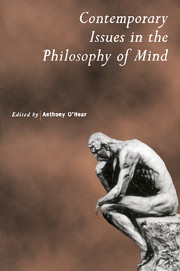Book contents
- Frontmatter
- Contents
- Notes on Contributors
- Introduction
- The Mind–Body Problem After Fifty Years
- How to Find the Neural Correlate of Consciousness
- Embodiment and the Philosophy of Mind
- Folk Psychology and Mental Simulation
- Understanding Other Minds from the Inside
- Self-knowledge: the Wittgensteinian Legacy
- Joint Attention and the First Person
- Consciousness as Existence
- Setting Things before the Mind
- Perceptual Intentionality. Attention and Consciousness
- Experience and Reason in Perception
- Intentionality as the Mark of the Mental
- Intentionality and Interpretation
- Externalism and Norms
- Mind, World and Value
- Mind, Knowledge and Reality: Themes from Kant
- The Modality of Freedom
- Dualism in Action
- Index
The Modality of Freedom
Published online by Cambridge University Press: 12 May 2010
- Frontmatter
- Contents
- Notes on Contributors
- Introduction
- The Mind–Body Problem After Fifty Years
- How to Find the Neural Correlate of Consciousness
- Embodiment and the Philosophy of Mind
- Folk Psychology and Mental Simulation
- Understanding Other Minds from the Inside
- Self-knowledge: the Wittgensteinian Legacy
- Joint Attention and the First Person
- Consciousness as Existence
- Setting Things before the Mind
- Perceptual Intentionality. Attention and Consciousness
- Experience and Reason in Perception
- Intentionality as the Mark of the Mental
- Intentionality and Interpretation
- Externalism and Norms
- Mind, World and Value
- Mind, Knowledge and Reality: Themes from Kant
- The Modality of Freedom
- Dualism in Action
- Index
Summary
The Problem as an Instance of the Integration Challenge
The classical problem of free will is one instance of the Integration Challenge. The Integration Challenge in its general form is that of reconciling our metaphysics of any given area with our epistemology for that same area. In the case of free will, the challenge is that of reconciling our seeming first-person knowledge of our exercise of free thought, deliberation, choice and action with a description of what is really going on in the world as characterized in terms of causation, determination, explanation and causal possibility.
There are at least six general theoretical options to be considered whenever we are faced with a philosophical problem which is an instance of the Integration Challenge. These options divide into two groups. Each of the two groups comprises three of the six options. The first group contains the conservative options of (i) providing an improved metaphysics which meets the challenge; (ii) providing an improved epistemology; and (iii) providing an improved conception of the relations between the appropriate metaphysics and epistemology. These options are evidently not exclusive of each other. Each of these options aims at head-on reconciliation. The options are conservative in the sense that proper, successful development of one of these options will attribute some truth condition to the problematic sentences, and will explain how we can come to know that they obtain, when we do.
- Type
- Chapter
- Information
- Contemporary Issues in the Philosophy of Mind , pp. 349 - 376Publisher: Cambridge University PressPrint publication year: 1998



